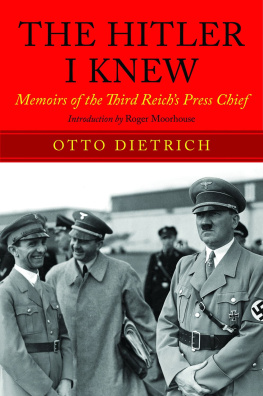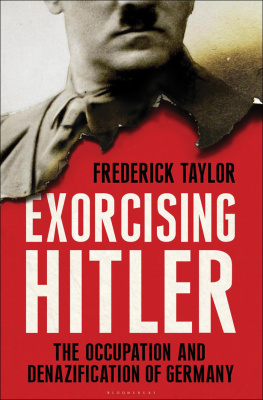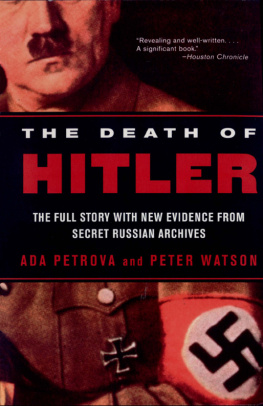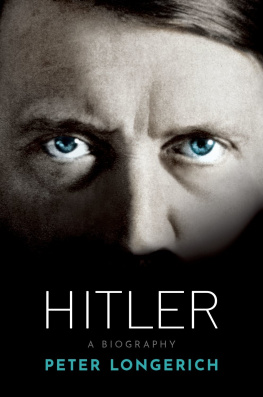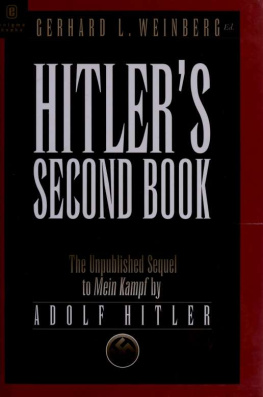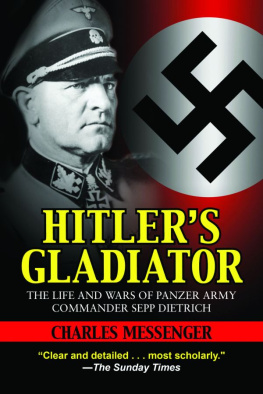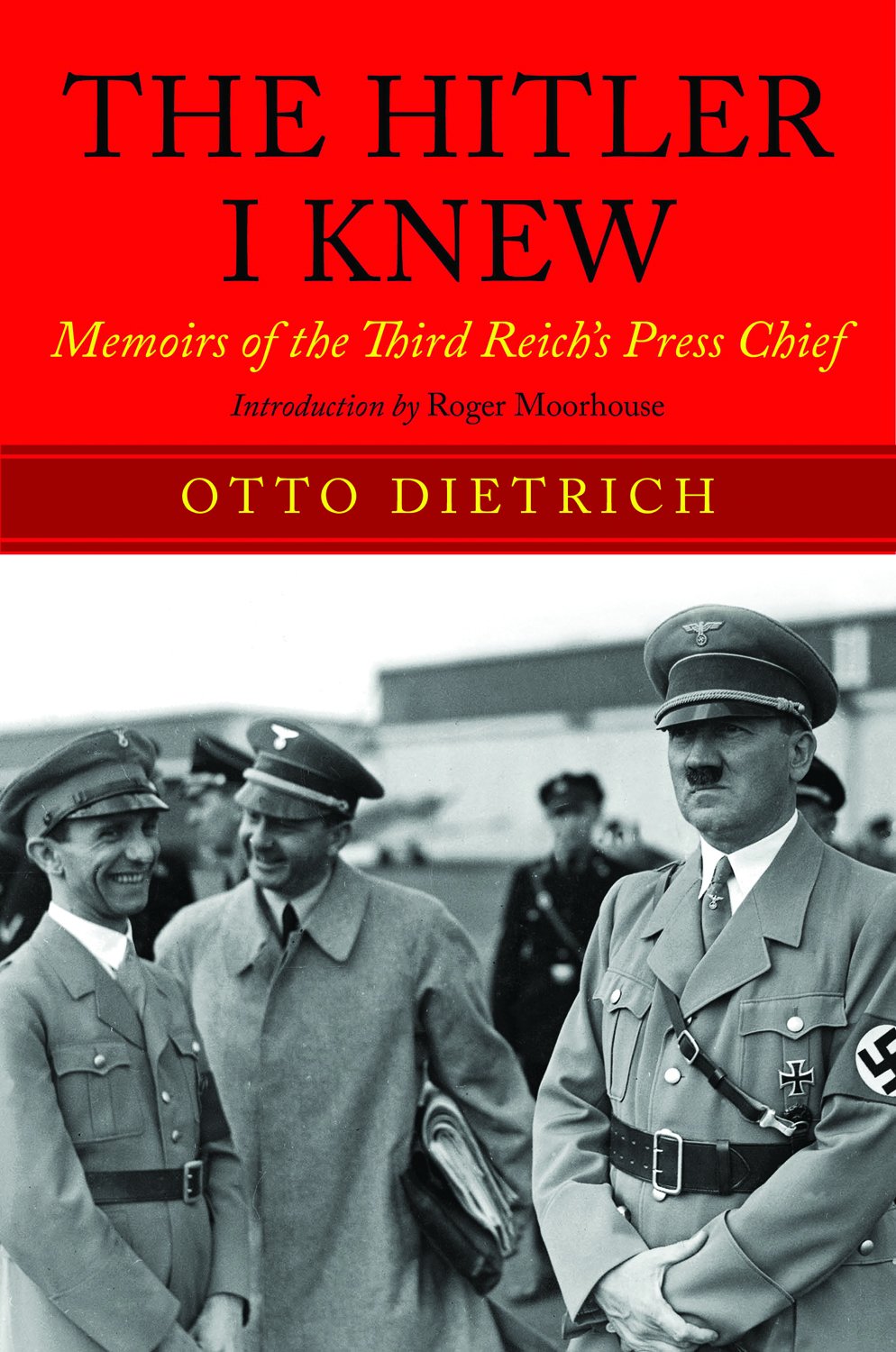Appendix 1
Preface
Publishers Note
The following is the authors preface to the original German edition, which was published in 1955.
T HE MAJORITY of the German people had put their trust in a single man, had revered him like a saint and loved him like a father. This man then led them into the greatest catastrophe in their history. That is the naked, brutal, and shocking fact, and the German people, reeling from the terrible blows of the war, groping among the ruins of their past, must face it. Millions are now seeking reasons and explanations for this unexampled collapse. Their search, however, follows the line of their preconceptions.
I am convinced that only a thorough and uncompromising knowledge of Hitlers personality, of his innermost nature and his true character, can explain the inexplicable. We can reach an understanding of the truth, of the guilt and destiny of Germany, only by understanding the uncanny magnetism of Hitlers personality. The mystery of Hitler is the prism in which all the rays of tentative knowledge are broken up. Only when these have been reunited can we arrive at the historical truth of recent events. Only Hitlers innermost nature can reveal to us the hidden background; only a true portrait of this man can explain the tragedy of the German people.
This titan has been overthrown, but the German people still lack any clarity about Hitler. Such clarity is the indispensable prerequisite for any successful emergence from the dbris-choked past into a better future. In all aspects of life real accomplishments can be achieved only if there is genuine concern and passionate devotion to a job. The German people will find the strength to rise again out of their tribulations and make their way into the community of peaceful nations only after they have overcome the past within themselves, out of their own deepest convictions. And to do that they need full knowledge of Hitlers character and works.
As fate would have it, I spent many years in a position which has enabled me to make a contribution to that necessary knowledge. For twelve years I was, as a publicity man, in Hitlers immediate entourage. I did not thrust myself forward to obtain this post. On January 30, 1933, when Hitler appointed Funk the new press chief of his government, he himself ordered me to remain in his personal following. Perhaps even then he thought of me as his future biographer. I came to esteem his likable traits and his efforts for the welfare of the people; but in the course of the years I also came to recognize how he had changed inwardly, and to hate his despotic nature. In spite of repeated attempts on my part to break free, he did not permit me to leave. I heard a great deal, but by no means learned everything; for things that were not meant for the public to know were kept from the ear of a newspaperman. Hitler knew how to keep silence. With rigid strictness he carried out the principle: Nobody need know more about important matters than is absolutely necessary for the performance of his duties. If only two persons need know something, no third person is to hear of it.
I took no notes. But out of a thousand details of Hitlers public and private life during more than twelve years I absorbed the essence of the personality of this mysterious manuntil that thirtieth of March 1945 when, in the small room of his concrete bunker under the Chancellery, he stripped me of my functionsafter a violent dispute.
Hitlers stupendous achievements during six years of extraordinary peacetime successes obscured his weaknesses. Six year of warfare brought to the fore his equivocal character traits and the excesses of his demonic personality. He was the standard-bearer, and as long as some hope remained of fending off a dire fate, innumerable Germans believed it was their solemn duty not to desert the flag.
Up to the last moment his overwhelming, despotic authority aroused false hopes and deceived his people and his entourage. Only at the end, when I watched the inglorious collapse and the obstinacy of his final downfall, was I able suddenly to fit together the bits of mosaic I had been amassing for twelve years into a complete picture of his opaque and sphinxlike personality. Revelation of the bestialities in the concentration camps at home and in Poland opened my eyes, and showed me in firm outline the shifting contours of this mans character. When we study his portrait in retrospect, the lights and shades fall quite differently from the way we used to see them. Up to the end, we were looking at the portrait from an entirely different angle. The uncanny duality of his nature and the monstrousness of his true being suddenly become apparent.
I have spent much time in recent months considering whether I as a German ought to make public my analysis and my private knowledge of Hitler. My personal observations are neither completely comprehensive nor absolutely final. But I trust that they have some point insofar as they dispel the last shreds of glamor from the myth of Hitlerif that myth is still alive and still exerts some fascination for posterity. What I have to say will help consign his figure to the doleful shades. For this reason I have come to feel that my knowledge must not be withheld from the peoplefor the peoples own sake. If my contemporaries, with their eyes fixed upon the past, fail to understand me, those who come after will surely profit from this account.
Facts are more powerful than theories. The course of world history has turned out very differently from what Hitler imagined. National Socialism was carried to excess; when it took off into the stratosphere of racist ideas, it lost touch with the solid ground of practical reality. Philosophical and psychological blinkers blinded it to the international aspects of mans recent history. It could not see that as progress and technology have increasingly overcome space and time and the peoples of the globe have moved closer to one another, the community within the borders of each separate nation has necessarily been tending toward a general community of all nations. For Hitler all human problems stopped at the very point where in modern times they truly begin. Today the significant and fateful questions of mans future progress will not be decided on the national plane, as Hitler thought, but on the international plane. This is an age of world-shakingthough possibly also world-wreckinginventions. Universal cooperation has become an inescapable necessity, if the nations are not to exterminate one another. And democracy in the broadest sense has become the only viable political form for a rational humanity. Within its flexible framework personalities and creative achievements will continue to stamp their impress upon history as they have always done. But in the future no politically mature nation will ever commit itself unreservedly to the hand of a single man and of an authoritarian government. Henceforth the democratic rules alone will regulate the game upon the chessboard of world politics. That is now a fact which needs no discussion; events have made it so. Consequently, if the German people do not wish to shut themselves out for all time from the community of nations, if after this collapse they desire to rebuild their life upon a new basis so as to share with other nations the benefits of culture and civilization, they must abandon all thought of going back to an absolutist leader-state of the Hitler type. They must recognize any propaganda for such a state as the spawn of a reactionary imagination. To revert to authoritarianism would bring about the final political suicide of the German nation. The memory of how tragically they went astray in the recent past ought to serve the German people as a historical lesson for all times: never again to entrust a single man with power, thereby surrendering to him their destinies and their lives. For the human weaknesses of even the greatest of mortals can wreak woe on a nation if that one man holds sole power over life and death, war and peace. It was precisely such power Hitler held in his own hands. He came to power as a socialistic popular leader, as the creator of new ideas. Because he rescued them from a dire economic catastrophe, the people believed his promises, hailed him as a bearer of good fortune, favorite of destiny, and conferred upon him total power. In the course of the years, as his character and his aims changed, he used this power to ruin the nation.

